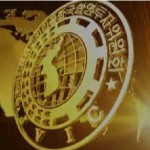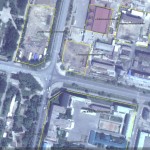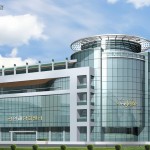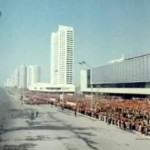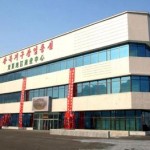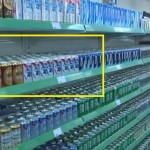The Joongang Ilbo reports some recent statistics from, the Kaesong Industrial Zone and some trade statistics between the two Koreas and China.
Inter-Korean and China trade (Joongang Ilbo):
Exactly two years ago, on May 24, 2010, in the aftermath of the deadly sinking of the Cheonan warship, the Lee Myung-bak administration imposed sanctions against North Korea that forbade all inter-Korean trade and South Korean investments in the North.
[…]
Statistics from the Korea International Trade Association show that the volume of inter-Korea trade in 2011 dropped by 10.4 percent, falling to about $1.7 billion from $1.9 billion in 2010. The Kaesong Industrial Complex, which was exempted from the sanctions, accounted for most of the inter-Korean trade.
In contrast, the volume of trade between North Korea and China surged by 62.4 percent in 2011, from $3.4 billion in 2010 to $5.6 billion.
“After stopping trade with South Korea, factories in Pyongyang and Nampo cities turned to Chinese companies and now work for them,” a South Korean businessman said on condition of anonymity. “It took so much time and money for us to teach North Korean employees and now Chinese companies enjoy the fruits of our labor.”
The North Korean government responded to the South Korean sanctions:
As talks between the two authorities have been halted, North Korea has unilaterally decided to raise taxes on income and management of the complex.
In fact, the North Korean regime earns significant money from the complex. South Korean firms pay the North Korean government an average of $126.4 per month for each North Korean worker. The government then distributes 5,000 won of North Korean currency and some food coupons to each employee per month. This wage is desirable compared to other worker payments in the North.
Analysts calculate that the regime is holding at least $50 million from the $77.8 million of the North Korean employees’ annual income.
At current black market rates, there are appx 4,450 DPRK won to for US$1.
The article notes, however, that the Kaesong Industrial Zone continues to grow:
Located only three kilometers away from the Military Demarcation Line, the inter-Korean complex has 123 South Korean companies and about 51,000 North Korean employees.
…
Currently, the South Korean government is implementing a scheme to build more roads and infrastructure for South Koreans crossing the border to commute to the complex (see here and here).
“Although Kim Yong-chol, former head of the policy planning office of the North’s powerful National Defense Commission, who has exerted a huge influence on operating the Kaesong complex, repeatedly threatened to shut down the complex since the May 24 sanctions, he’s recently been more cooperative, saying ‘Let’s make it better,’” a high-ranking government source told the JoongAng Ilbo.
Unlike the frosty inter-Korean relations, the sales performance of the joint industrial complex is positive. For the past three years, 55 South Korean firms additionally moved into the complex and the annual output value surpassed $400 million in 2011, jumping from $180 million in 2007.
Last year’s volume is 30 times that of the $14.91 million in 2005, when the complex made its first yearly outputs. The total output value since 2005 has accumulated to $1.5 billion.
[…]
Currently, roughly 160,000 people are living in Kaesong city and approximately one out of three are working in the complex
The article also reports on additional DPRK-China projects that are not necessarily a result of higher barriers to commerce between the two Koreas (dredging, mining, labor mobility, and SEZs):
“A Chinese firm based in Yanji is now implementing a 60-kilometer-long (37-mile) dredging project in the Tumen river bed,” a government-affiliated research official said.
“It’s not simple dredging work, but a plan to mine the iron ore buried nearby.”
“In the river bed, about 30 percent of the sand contains iron ore,” the official said.
The regime also exports their labor forces to their closest ally.
“Most of the local people left for South Korea to get a decent job and the average wage for a Chinese worker is increasing,” a Chinese factory manager in Yanji said. “So we are planning to hire North Korean workers instead.”
Pyongyang and Beijing are also focusing on developing the two special economic zones, Rason and Hwanggumpyong in northeastern North Korea.
When Chen Deming, the Minister of the Chinese Ministry of Commerce of China, and South Korean Trade Minister Park Tae-ho had a bilateral meeting on May 2 to start negotiations on the Korea-China free trade deal, they included a provision stating the two countries will allow preferential tariffs on goods produced in designated zones.
“Hwanggumpyong is like a Kaesong Industrial Complex to China,” a South Korean authority said. “The Hwanggumpyong zone has the same function as Kaesong, composed of China’s capital and technology and North Korea’s land and labor forces.”
In the Rason Economic Zone, China has finished construction paving the 53-kilometer-long road connecting the Rason zone and a local tax office in Wonjong-ri, a North Korean village close to China.
The Chinese government also arranged a harbor near the Rason area, constructing a pier that can accept a three million-ton ship and building a bus route between an express bus terminal in China and the zone.
“If China uses the Rason harbor, they can save $10 per metric ton,” Jo Bong-hyeon, a senior official at the Industrial Bank of Korea, said. “It’s really good business for China, enough to invest money on building infrastructure in the zone.”
Read the full story here:
Kaesong complex running well despite sanctions
JoongAng Ilbo
2012-05-23

